Portuguese Manufacturing Embraces Robotic Revolution: Key Statistics and Industry Growth
The Portuguese manufacturing sector is experiencing a profound transformation through robotics and automation, positioning itself as a competitive force in the European industrial landscape. With the industrial robotics market projected to reach US$56.50 million by 2028, growing at 8.07% annually, Portugal demonstrates significant momentum in adopting cutting-edge automation technologies across various manufacturing segments. Companies looking to establish operations can benefit from manufacturing setup services in Portugal to navigate this evolving landscape.
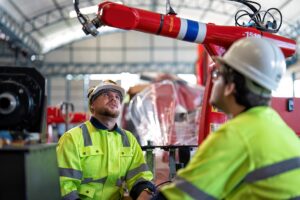
Current State of Industrial Robotics in Portugal
Portugal’s robotics market showcases remarkable growth potential within the broader European context. The total robotics market, encompassing both industrial and service applications, is expected to grow from its current valuation to US$136.90 million by 2028, representing a 6.27% compound annual growth rate. This expansion reflects the country’s strategic focus on digital transformation and Industry 4.0 initiatives.
The Portuguese manufacturing industry has become increasingly sophisticated, with robotics playing a crucial role in enhancing productivity and maintaining competitive advantages. Major sectors driving this adoption include automotive manufacturing, electronics production, metal processing, and food and beverage industries. These sectors represent the backbone of Portugal’s advanced manufacturing capabilities, contributing significantly to the nation’s export economy.
Recent data indicates that European industrial robot installations reached a record 92,393 units in 2023, with Portugal contributing to this growth through strategic investments in automation. The country benefits from its position within the European Union, where 80% of industrial robot installations occurred, demonstrating the region’s commitment to manufacturing excellence. This growth is supported by comprehensive technology consulting services that help manufacturers implement robotic solutions effectively.
Key Industry Sectors Driving Robotic Adoption
Automotive Manufacturing Leading the Charge
The automotive sector remains Portugal’s primary driver for robotics implementation, accounting for approximately 35% of the collaborative robot market share. Portuguese automotive manufacturers have invested heavily in robotic systems for assembly line operations, welding applications, and quality control processes. Major automotive companies operating in Portugal utilize robots for door panel installation, machine parts handling, and precision assembly tasks.
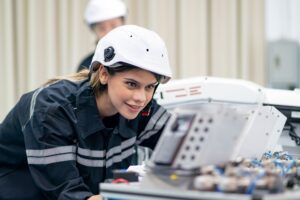
This sector’s commitment to automation stems from the need to maintain competitiveness in global markets while ensuring consistent quality standards. The integration of collaborative robots (cobots) has been particularly significant, allowing human workers and machines to operate side by side safely and efficiently.
Electronics and Semiconductor Industries
Portugal’s electronics manufacturing sector has emerged as a significant adopter of robotic technologies. With the global trend toward miniaturization and increased precision requirements, Portuguese electronics manufacturers rely on robots for:
- Soldering and component placement
- Circuit board assembly
- Quality inspection and testing
- Material handling and packaging
The electronics segment holds a substantial market share, driven by the need for high-precision operations that human workers cannot consistently achieve. Advanced vision systems integrated with robotic platforms ensure defect-free production, reducing rework and maintaining stringent quality standards.
Metal Processing and Machinery
The metal processing industry in Portugal actively engages in innovation, supplying sophisticated markets across Europe and North America. Between 2018 and 2022, this subsector experienced significant export growth, particularly to markets including Italy, Norway, Ireland, Finland, and the United States. Portuguese metal manufacturers employ robots for:
- Welding and cutting operations
- Material handling in hazardous environments
- Precision machining and finishing
- Quality control and measurement
Investment Trends and Market Growth
Portugal’s commitment to robotic automation is evidenced by substantial investments across various manufacturing sectors. The R&D investment in the Electric, Electronic and Mechanical Engineering subsector grew by 41% between 2016 and 2020, demonstrating the industry’s focus on innovation and technological advancement.
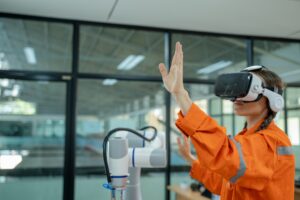
International companies have recognized Portugal’s potential, with several major investments announced:
- Bosch Group: Installing a new production line for heat pump manufacturing in Aveiro, creating 300 jobs and investing €12 million
- WEG Group: Constructing a €23 million facility in Santo Tirso for electric motor production
- Coficab Group: Investing €30 million in a new industrial unit in Guarda for automotive cable development
These investments underscore international confidence in Portugal’s manufacturing capabilities and skilled workforce.
Technological Innovations and Industry 4.0 Integration
Portuguese manufacturers are embracing Industry 4.0 principles through the integration of:
Artificial Intelligence and Machine Learning

Modern robotic systems in Portuguese factories incorporate AI for predictive maintenance, quality inspection, and dynamic decision-making. Machine learning algorithms enable continuous improvement in robotic performance, optimizing production processes over time.
Collaborative Robotics
The adoption of cobots has democratized robotic automation, making it accessible to small and medium-sized enterprises (SMEs). These systems offer:
- Easy programming through intuitive interfaces
- Safe human-robot collaboration
- Flexible deployment across different tasks
- Lower implementation costs compared to traditional industrial robots
Digital Twin Technology
Portuguese manufacturers increasingly utilize digital twin technology to simulate and optimize robotic operations before physical implementation, reducing deployment risks and improving system efficiency.
Employment Impact and Workforce Transformation
While automation raises concerns about job displacement, Portugal’s approach focuses on workforce transformation rather than replacement. A 2019 study by CIP (Confederation of Portuguese Industry) projected that while 1.1 million jobs might be affected by automation by 2030, between 600,000 and 1.1 million new positions could be created in the best-case scenario.
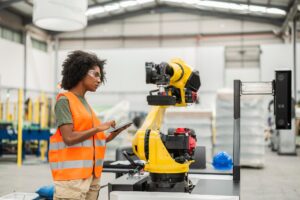
The manufacturing sector employed approximately 728,780 workers as of September 2024, with robotics creating new opportunities in:
- Robot programming and maintenance
- System integration and optimization
- Data analysis and process improvement
- Technical supervision and quality control
Portugal’s education system has responded by developing specialized programs, including Technical Superior Professional Courses in Automation, Robotics, and Industrial Control, preparing the workforce for Industry 4.0 requirements.
Research and Development Ecosystem
Portugal’s robotics innovation is supported by a robust R&D ecosystem, including:
INESC TEC

The Institute for Systems and Computer Engineering, Technology and Science operates the Center for Industrial Robotics and Intelligent Systems, developing innovative solutions for industrial, agricultural, and forestry applications. Their TRIBE LAB focuses on agricultural robotics and IoT integration.
Portuguese Robotics Society (SPR)

Organizing the annual National Robotics Festival, SPR promotes robotics education and research, fostering collaboration between academia and industry. The 2024 edition in Paredes de Coura showcased Portugal’s latest robotic innovations and research achievements.
Academic Institutions

Universities including NOVA FCT, University of Porto, and University of Minho offer specialized programs in robotics engineering, ensuring a steady pipeline of qualified professionals for the industry.
Future Outlook and Emerging Trends
Looking ahead to 2025 and beyond, several trends will shape Portugal’s robotic manufacturing landscape:
Sustainable Manufacturing
Portuguese manufacturers increasingly integrate robotics to achieve sustainability goals through:
- Energy-efficient robotic systems
- Precision manufacturing reducing material waste
- Circular economy principles in production processes
Advanced Automation Technologies
The integration of 5G networks, edge computing, and cloud-based solutions will enable more sophisticated robotic applications, including:
- Real-time collaborative manufacturing
- Remote monitoring and control
- Predictive analytics for maintenance optimization
Expanding Application Areas
While traditional sectors continue to drive adoption, emerging applications include:
- Pharmaceutical and biotechnology manufacturing
- Renewable energy component production
- Customized and small-batch manufacturing
Challenges and Opportunities
Despite significant progress, Portuguese manufacturers face challenges including:
- Initial investment costs for robotic systems
- Skills gap in advanced automation technologies
- Integration complexity with existing systems
- Competition from other European manufacturing hubs
However, opportunities abound through:
- EU funding programs supporting digital transformation
- Portugal’s strategic location for nearshoring initiatives
- Growing demand for automated manufacturing solutions
- Strong government support for Industry 4.0 adoption
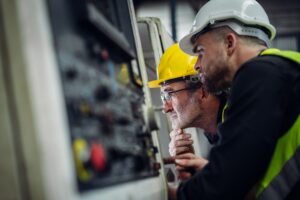
Portugal’s manufacturing sector stands at the forefront of robotic innovation, leveraging advanced automation to enhance competitiveness and drive economic growth. With projected market expansion, substantial investments, and a supportive ecosystem, Portuguese manufacturers are well-positioned to capitalize on the opportunities presented by the Fourth Industrial Revolution.
The integration of robotics represents not merely a technological upgrade but a fundamental transformation of Portugal’s industrial landscape. As manufacturers continue to embrace these technologies, Portugal solidifies its position as a key player in European advanced manufacturing, offering sophisticated solutions for global markets while creating new opportunities for its workforce.
For businesses considering robotic automation or investors exploring opportunities in Portuguese manufacturing, the current trajectory indicates a market ripe with potential, supported by technological innovation, skilled human capital, and strategic vision for sustainable industrial growth.
